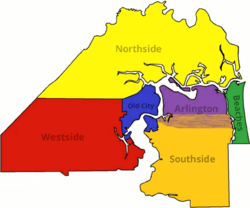Mandarin (Jacksonville)
Mandarin is a neighborhood located in the southernmost portion of Jacksonville, in Duval County, Florida, United States. It is located on the eastern banks of the St. Johns River, across from Orange Park. Mandarin was named after the mandarin orange[1] in 1830 by Calvin Reed, a prominent resident of the area .
Once called "a tropical paradise" by author Harriett Beecher Stowe, the quaint area of Mandarin is marked by its history, ancient oak trees draped with Spanish moss, beautiful parks, marinas and more water views than any other area in Jacksonville. In the 19th century, Mandarin was a small farming village that shipped oranges, grapefruit, lemons and other fruits and vegetables to Jacksonville and points north on the steamships that traveled the St. Johns River. In 1864, the Union steamship, the Maple Leaf, hit a Confederate mine and sank just off Mandarin Point.
Just a short drive south of Jacksonville's city center, the community is bordered by Beauclerc to the north, Julington Creek to the south and St. John's River to the west.
History
Harriet Beecher Stowe
In 1867 Harriet Beecher Stowe, the famous author of Uncle Tom's Cabin, bought a cottage here. For the next seventeen winters, she welcomed tourists' debarking from the steamers along the St. Johns River. She charged them 75 cents each to meet her and admire her surroundings.
Although best known for her novel about the cruelty of slavery, Stowe also wrote about Florida. She had promised her Boston publisher another novel, but was so taken with northeast Florida that she produced instead a series of sketches of the land and the people. She submitted it in 1872 under the title Palmetto Leaves. Her second book did not outsell her first novel, but did have the effect of drawing rich and fashionable tourists to visit her.
In Palmetto Leaves, Stowe describes life in Florida in the latter half of the 19th century; "a tumble-down, wild, panicky kind of life—this general happy-go-luckiness which Florida inculcates." Her idyllic sketches of picnicking, sailing, and river-touring expeditions; and simple stories of events and people in this tropical "winter summer" land became the first unsolicited promotional writing to interest northern tourists in Florida.[2]
20th century
In 1968, the city of Jacksonville and most of Duval County formed a consolidated municipal unit. As part of this process, Mandarin ceased to exist as a political entity, and became part of the city of Jacksonville.
In 1990, with the rapid growth of Mandarin, a new public high school was opened in the area. Several prominent citizens in Jacksonville urged that the new school be named Harriet Beecher Stowe High School, but the proposal did not receive widespread acceptance. The school was named Mandarin High School.
Geography
Mandarin is located at 30°09′37″N 81°39′34″W / 30.1603°N 81.6594°WCoordinates: 30°09′37″N 81°39′34″W / 30.1603°N 81.6594°W (30.1603, -81.6594).[3]
Honors
A small chapel in Mandarin is dedicated to Harriet Beecher Stowe.
Famous residents
- Allen Collins from the rock band Lynyrd Skynyrd resided some of his last years in Mandarin.
- Consumer advocate Joe Cury lived and worked in Mandarin.
- Business coach and consultant Libby Gill grew up in Mandarin.
References
- ↑ Gannett, Henry (1905). The Origin of Certain Place Names in the United States. U.S. Government Printing Office. p. 197.
- ↑ "Palmetto Leaves". University Press of Florida. Archived from the original on August 23, 2006. Retrieved 2006-09-06.
- ↑ "US Gazetteer files: 2010, 2000, and 1990". United States Census Bureau. 2011-02-12. Retrieved 2011-04-23.
